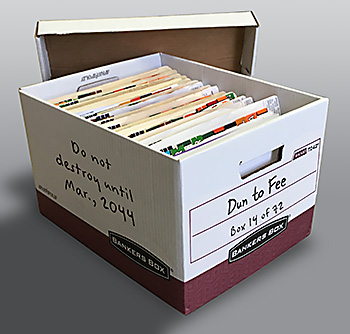What were they thinking?

The average family practice must store 70 to 90 heavy bankers boxes like this after closing.
Some years ago, a retiring Ontario doctor opted to store his paper patient records in his cottage boathouse, which ended up collapsing, sending all 50-plus boxes floating into the lake. Venturing out in a rowboat, the distressed doc fished the boxes and their accompanying soggy pages of personal medical data out of the lake and had to destroy the now-worthless records. Imagine the reaction of the patients and requestors of that information who had to be informed of the unfortunate tale regarding their lost medical histories.
As this factual horror story illustrates, proper medical record storage is critically important.
Beyond the legal storage requirements (typically, 10 years after date of last entry or, for minors, 10 years after they reach the age of majority), retiring doctors must store records to ensure patient access and continuity of care.
With so much at stake, the risks of self-storage must be considered:
- Records are vulnerable to fire / flood / mold.
- Patients are legally entitled to access their records in a timely fashion, so how will retired doctors, when they’re out of town, meet their record-retrieval obligations that require moving heavy boxes often stacked precariously to the ceiling?
- Records are now highly vulnerable to theft, permanently jeopardizing patient privacy.
- Missing / Misfiled Records. Imagine having to sift through 70 bankers boxes (each weighing 35 lbs) searching for that one lost or misfiled record. It happens all the time.
- Insurance. “Doctors must understand the legality, sensitivity and value of the documents they are storing. They should know or ask questions about their personal and commercial insurance to ensure they have the necessary coverage for these documents in the event of a loss,” said a spokesman for State Farm Canada.
- Expensive and unwieldy shredding of records once the legally mandated storage period expires.
For all these reasons, the Canadian Medical Protective Association (CMPA) recommends using a professional record storage company versed in the rules and regulations concerning medical record retention.
Since 1997, RSRS has been Canada’s leading specialist in medical record storage. RSRS’ professional facilities are safe, secure and humidity controlled, to prevent mold. RSRS will organize your records and guarantee prompt retrieval whenever your patients need access.
Call RSRS today at 1-888-563-3732, ext. 2 or visit www.recordsolutions.ca.

